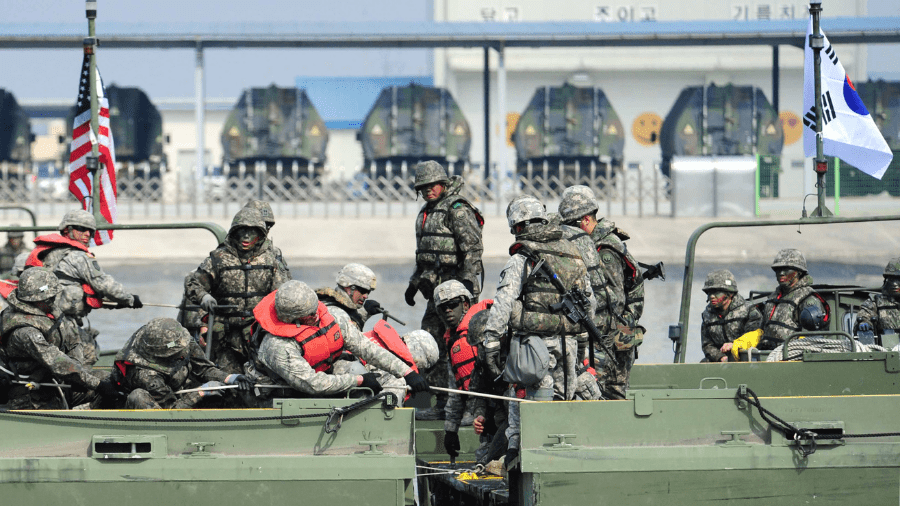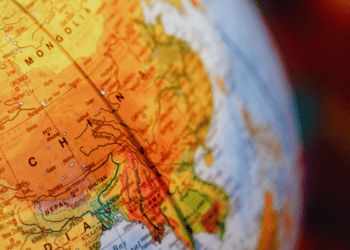This article was originally published for the Australian Institute of International Affairs.
By Stephen Nagy, May 18, 2023
On the occasion of the 70th anniversary of the ROK-US alliance, South Korea and the US further strengthened their relationship by agreeing to the Washington Declaration. To Beijing, the declaration adds another layer to what it sees as a threat to the Communist Party’s very existence.
The declaration is based on extended deterrence and enhancing South Korea’s trust in US security guarantees. It includes increased visits of nuclear armed submarines in and around the peninsula, consultation on nuclear planning through the newly formed Nuclear Consultation Group, and it reaffirmed the “ROK’s longstanding commitment to its obligations under the Nuclear Nonproliferation Treaty as the cornerstone of the global nonproliferation regime as well as to the U.S.-ROK Agreement for Cooperation Concerning Peaceful Uses of Nuclear Energy.”
Predictably, China has expressed deep concerns about the potential ramifications of the new bilateral agreement signed between the United States and South Korea, which aims to bolster regional security efforts in and around South Korea but also in the Indo-Pacific at large, a formulation Beijing sees as an attempt to geopolitically isolate China.
Beijing’s criticism of the declaration between Seoul and Washington is tangentially connected to how Beijing has explained its pro-Russian neutrality stance after Putin’s invasion of Ukraine, “When one country’s pursuit of security compromises that of others, it will only create more risks and greater uncertainty.”
From China’s perspective, this agreement represents a significant shift in the nuclear balance of power in the region, with the possibility of a U.S.-led coalition dominating the security landscape through an extended deterrence strategy that locates US nuclear assets in China’s backyard.
Based on its Five Principles of Peaceful Coexistence, China has long maintained that it seeks only peaceful coexistence with its neighbors and is wary of any military alliances that could threaten its strategic interests. As such, the new agreement between Washington and Seoul is viewed with deep suspicion by Chinese officials. It reaffirms their view that the U.S. and its allies are attempting to contain China in the same way it contained the Soviet Union during the Cold War.
At the root of this insecurity is China’s belief that the U.S. is seeking to intentionally encircle it with a series of strategic alliances designed to contain its rise as a global power. This perception is driven by the U.S.’s ongoing efforts to forge close relationships with key allies in the region, including Japan and South Korea, as well as more contentious political entities like Taiwan.
Additionally, from China’s perspective the agreement between the U.S. and South Korea is just the latest in a series of moves by Washington that could potentially destabilise the region. The U.S. has long maintained a significant military presence in South Korea, stationing more than 35,000 troops in the country as a deterrent against the possibility of a North Korean attack. China sees this as a provocation, arguing that the U.S. has no business stationing troops in the region when it has no direct stake or role to play in the ongoing tensions between the two Koreas.
At the same time, it plays down its own interests in a divided Korean peninsula that ensures no pro-U.S. or pro-Western neighbor sits on its doorstep. Similarly, Beijing ignores how its threats towards Taiwan, the crushing of civil society in Hong Kong through the imposition of the National Security Law, and its menacing behaviour in the East and South China Seas unsettles its neighbours.
In the context of this broader geopolitical struggle, then, the Washington Declaration agreement between the U.S. and South Korea can be seen as a significant upgrade in the level of cooperation between two allies in the region. The agreement allows the two nations to discuss and plan nuclear strategy, to share intelligence and military resources, including advanced technology and logistics services to better counter any potential threats from North Korea. Additionally, the agreement allows for closer coordination of military exercises and training, further streamlining the integration of the two nations’ defense forces and bolstering their combined military capabilities.
For China, these factors are weighted against the potential risks posed by the prospect of an increasingly securitised U.S.-led coalition in the region. The fear is that this could increase regional tensions and potentially disrupt China’s ability to assert its own core interests of: 1) state sovereignty; 2) national security; 3) territorial integrity; 4) national reunification; 5) China’s political system established by the Constitution and overall social stability; and 6) basic safeguards for ensuring sustainable economic and social development.
Of particular concern is the possibility that the agreement could lead to a more active and coordinated regional posture by South Korea, which China fears could destabilise the region even further. From Beijing’s perspective, South Korea’s Strategy for a Free, Peaceful, and Prosperous Indo-Pacific Region, interest in joining or cooperating with the Quadrilateral Security Dialogue (Quad), and statements about Taiwan as a security concern are evidence that its anxieties about South Korea are coming true.
Wisely, under President Yoon Suk Yeol, South Korea has been pushing harder for stronger security arrangements with the U.S. and engaging in a more transparent and explicit security guarantee to counter growing North Korean capabilities, including the possibility of tactical nuclear weapons that are being developed alongside a plethora of missile systems. This has led to concerns that South Korea could become a more active participant in U.S.-led security cooperation in the region, minilateral cooperation within the Quad, and firewalling advanced semi-conductors from China – all would have the effect of heightening tensions with China.
Just as concerning is the potential impact the Washington Declaration could have on the larger strategic landscape in the region. China has long sought to establish itself as the regional hegemon in Asia, with a focus on consolidating its control over the South China Sea and its associated sea lines of communication. For China, any moves by the U.S. to forge closer partnerships with key allies in the region represent a direct threat to its ambitions, particularly if these partnerships are backed by military force.
China’s concerns about the new U.S.-South Korea agreement can be understood through the lens of its broader strategic goals in the region. From its perspective, any moves by the U.S. to strengthen its regional alliances and potentially create a more potent military presence represent a serious existential threat to China’s long-term security interests. As such, China is likely to continue to view the Washington Declaration, South Korea’s Indo-Pacific tilt, and deepening trilateral engagement with Japan and the US with intense suspicion and take steps to counteract any perceived threats to its strategic posture in the region. At the same time, Washington and Seoul are likely to continue to push for closer security ties to better protect against the ongoing threat from North Korea and other regional security challenges. Ultimately, then, the Washington Declaration represents yet another flashpoint in the ongoing geopolitical struggle between China and the U.S., and a potential source of future conflict and regional instability.
Stephen Nagy is a Professor at the Department of Politics and International Studies at the International Christian University. Concurrently, he is a senior fellow at the MacDonald Laurier Institute.






